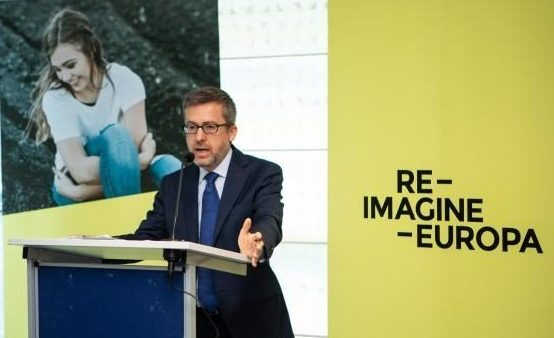Brussels Science in Society Salon, 8 October 2019, European Parliament
On the 8th of October, Re-Imagine Europa organised a Brussels Science in Society Salon lunch on the topic of “Science, Democracy and the Future” at the European Parliament. Hosted by Professor Maria da Graça Carvalho MEP, the event was structured as a high-level salon to allow for real debate and discussion.
Commissioner Carlos Moedas opened the discussion with inputs from Prof. Rolf Heuer (Chair) and Prof. Janusz Bujnicki of the European Commission’s Group of Chief Scientific Advisors. MEP Andrius Kobilius conluded the lunch debate.
While giving her remarks, Ms Carvalho stated that today “It is extremely difficult to explain to people the point of science and innovation in the context of such rapid change“.
In his keynote speech, Commissioner Moedas praised the results of the first edition of the Science in Society Salon and underlined the importance of the work developed by the Group of Chief Scientific Advisers and the Science Advice Mechanism. He stressed the need for more moments of debate and confrontation between scientists, policy makers and members of the civil society and introduced the “Report on Genome Editing in Agriculture – Implications for Society”, developed by Re-Imagine Europa outlining the results of the discussions held in April at the first edition of the Brussels Science in Society Salon.
In reference to the report presented, Janusz Bujnicki, professor of biology and part of the Group of Chief Scientific Advisors of the European Commission explained that it is difficult to establish what can be defined as “natural” today, since through crossbreeding men have been modifying the environment fro thousands of years, adapting it to their needs. “Gene editing is not good or bad in itself; obviously it depends on what is the purpose and what are the results”, said professor Bujnicki.
Later during the event, the chair of Chief Scientific Advisors of the European Commission professor Rolf Dieter Heuer underlined the paramount importance of building a strong relationship between scientists and policy makers, in order to have a solid scientific approach to law and policy making. Professor Heuer remarked the need for greater communication between scientists and the public, dictated by the growing complexity of science and technology: “The relationship between science and society has never been as important as it is today. The current crisis of trust in expertise highlights the strong need for a new narrative: a narrative that is capable of improving the understanding that people have of the changes that technology is bringing into society”.
Mr Andrius Kobilius, MEP, concluded the debate noting that “In politics, emotions are very important to create consensus. We must find a narrative that is able to show science objectively or Europe will lose its role as an ethical guide in the eyes of the rest of the world“.
In the coming weeks a report on the outcomes of the “Science, Democracy and the Future” event will be developed and published.




